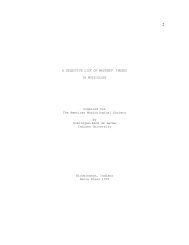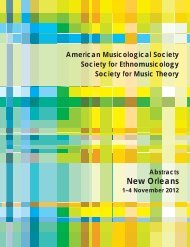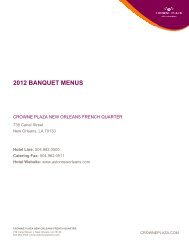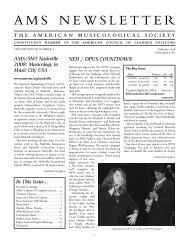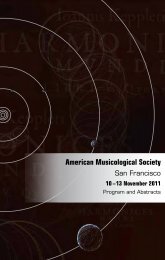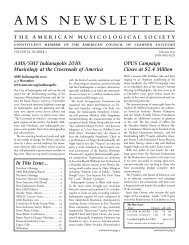AMS Philadelphia 2009 Abstracts - American Musicological Society
AMS Philadelphia 2009 Abstracts - American Musicological Society
AMS Philadelphia 2009 Abstracts - American Musicological Society
Create successful ePaper yourself
Turn your PDF publications into a flip-book with our unique Google optimized e-Paper software.
<strong>Abstracts</strong> Friday evening 107<br />
flagged popular songs as political metonyms. Arguably, though, the most precipitate musical<br />
influence of the century, vehicle for a revolution in taste pregnant for the twentieth century,<br />
came with Sankey and Moody’s gospel hymns, rarely out of the Bristol news after 1873. Finally,<br />
preceded by Gilmore’s band in 1878, the first “sound of America” sensation arrived in the<br />
1890s with the two-step (the Washington Post) because this decade reflected new economic<br />
and political strategies. Since <strong>American</strong> art music remained below the horizon throughout<br />
the century except at its aesthetic margins, another “second story” of the nineteenth century<br />
here emerges.<br />
EXPLORING THE EFFECT OF PROKOFIEV’S MOVE<br />
TO AMERICA ON HIS PIANO WRITING<br />
Gary O’Shea<br />
University of Sheffield<br />
A stylistic development is noticeable in the piano-writing of Serge Prokofiev between his<br />
time studying at the St. Petersburg Conservatory and his move from Russia to America in<br />
1918. The paper will draw upon the progressive looking Sarcasms op. 17 (1914), and Visions<br />
Fugitives op. 22 (1915–17), which demonstrate heavy influences from Stravinsky and Debussy,<br />
and consider why, after he moved to America, he opted for a simpler and less harmonically<br />
daring style in the tales of an old grandmother op. 31 and Four Pieces op. 32 (both 1918).<br />
To establish what may have prompted Prokofiev to change his approach, I draw on his<br />
newly published diaries to analyze his compositional processes at the time, and to discover<br />
whether the stylistic change came about through personal choice or necessity. Prokofiev had<br />
to make a living primarily as a performer, so was it this that caused him to write simpler music<br />
for the more conservative <strong>American</strong> audiences? To assess the audience reactions of the time, I<br />
will present extracts from newspaper reviews of Prokofiev’s recitals.<br />
IMPROVISING EDUCATION: LEARNING JAZZ IN 1920s BRITAIN<br />
Catherine Tackley<br />
Open University<br />
Following the introduction of jazz to Britain, transatlantic connections became increasingly<br />
important for British musicians who wished to develop their jazz skills. Although <strong>American</strong><br />
jazz recordings were obtainable in Britain, the extent to which improvisation was fully understood<br />
as an integral part of the music was initially limited. Crucially, <strong>American</strong> musicians<br />
provided live experiences of jazz as well as more direct education for musicians that allowed a<br />
more nuanced interpretation of jazz recordings.<br />
Contact between British and <strong>American</strong> musicians was controlled by increasingly restrictive<br />
governmental policies on visiting musicians from both sides of the Atlantic, culminating in a<br />
near-total reciprocal ban from 1935. Initially, however, the British government encouraged the<br />
employment of individual <strong>American</strong> musicians rather than whole bands. This was immensely<br />
beneficial in encouraging much greater interaction between British and <strong>American</strong> musicians,<br />
which defines a formative period in British jazz. This paper will explore the formal and informal<br />
activities of <strong>American</strong> musicians in Britain during the 1920s, and their impact on the<br />
development of British jazz. Ultimately, these instances of “jazz in Britain” provided a basis for<br />
a more self-sufficient “British jazz.”



